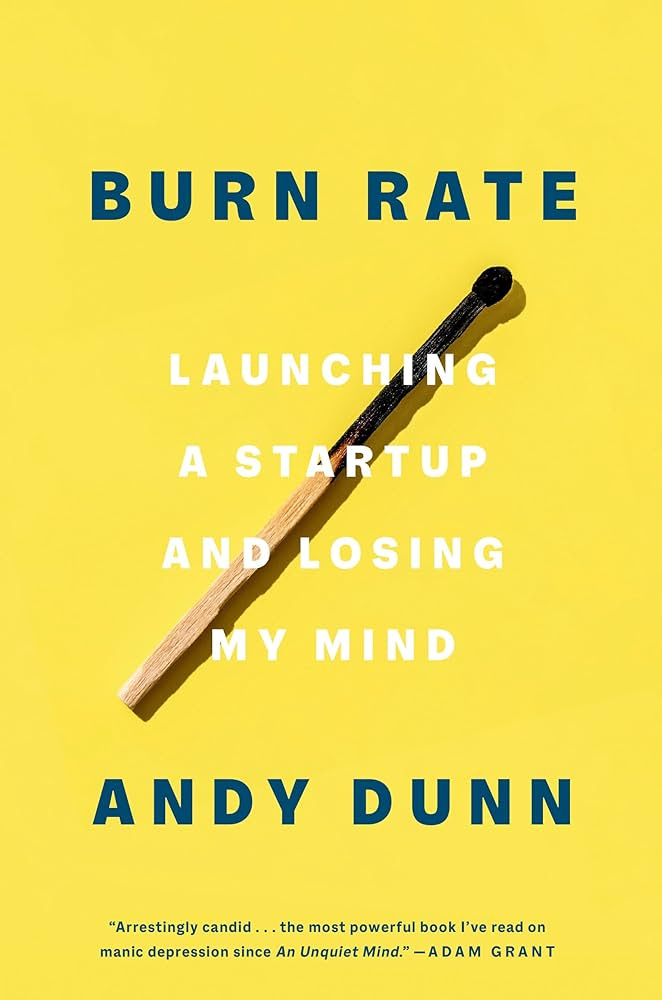When you have mental illness inside the family, you just don’t talk about it.
I know it first hand, having a close family member with Bipolar disorder (also known as manic depression). You do everything you can to avoid that topic.
Why it matters
Nobody talks about it, but the startup world is closely connected to mental health.
72% of founders struggle with mental health, and they are [source]:
2X more likely to experience depression (30% of founders vs 15% of the general popultion)
3X more likely to experience addiction (12% vs 4%)
11X(!) more likely to have a Bipolar diagnosis (11% vs 1%)
Entrepreneurs are not alone. 87% of employees said that working at a startup had negatively impacted their mental health.
In Burn Rate: Launching a Startup and Losing My Mind, Andy Dunn shares his raw story, as a startup founder with bipolar disorder he tried to hide from the world (and himself).
Why it’s so common in startups
The high stakes and uncertainty.
I’ve been in the startup world for 4 years now, and it’s tough. It’s not like a 9-5 job where every day you come to the office, do your thing, and go eat dinner with your family, having the same routine for years.
In a startup:
You’ll probably end up laid off, as most startups fail.
You might work during the weekends and evenings, because there is no one else to do the job.
Every day is different. Pivots happen, priorities change, and a feeling of utter chaos is not so rare.
If you are a manager, and especially a founder — add to that the feeling of responsibility for your people, and the guilt when you feel you let them down.
Some people are not affected at all and even enjoy that atmosphere. But for most of us, it can trigger burnout, mental breakdowns, and in rare cases even long-term mental illness.
How does mental illness look like
When I was young, I used to think that anti-depression pills were for weak people, or without supportive surroundings. You know, that with good habits and some meditation, you can overcome any disbalance in your brain.
It’s hard to understand how depression feels like - I never experienced it, and it’s impossible to imagine a feeling you never had.
After reading the book, I finally feel like I understand.
Dunn shares the raw and ugly reality of both depression and manic episodes. In one intense episode, when his now-mother-in-law and his now-wife tried to stop him from running outside naked, he hit and hurt them both. He was later arrested for felony and misdemeanor assault.
During his episodes, he believed himself to be god, and wanted to commit suicide. He shared how he couldn’t get out of the depression no matter what he tried, how it’s not about ‘staying positive’. The complete hopelessness when you realize your brain is just fucked up.
The matter-of-fact tone is chilling. You read the first-person account of someone completely coherent, a great and smart guy, who just can’t control his thoughts and actions.
Look around you, and talk about it
Do you imagine yourself sharing with your co-workers that you have a mental illness?
When he was 20, Dunn had his first manic episode in college.
Everyone treated it like it was a single-time nervous breakdown. His family closed their eyes and hoped for the best.
Here’s how Dunn describes his and his close ones’ approach to his first episode:
One day you're a 20-year-old who thinks that the world is their oyster and the next day you've got this thing and it's hanging over you, and by the way, there's a one in five chance that you're gonna end your own life.
You're only 20 years old and now you're thinking about these weighty concepts. The natural thing one does when presented with that is to reject it. Partly because you're hearing it when you're coming down from a psychotic episode, you're not necessarily in the best state of mind to process a diagnosis either.
So I just didn't believe that I had it because I rejected the diagnosis. We, as a whole family actually, found a way to tell ourselves a story, which is that it was related to some mescaline psilocybin use from three weeks earlier.
I was a senior in college. I was drinking a lot, smoking a lot of pot, and for the first time I tried mushrooms with some friends and so there was a narrative that we constructed, which is that it must have been the mushrooms that had caused the episode, that otherwise this wouldn't have happened and therefore the diagnosis was not accurate.
A few years after founding Bonobos, he had a severe episode and was diagnosed as bipolar. He shared his diagnosis with his investors and team, as part of his effort to be transparent about his mental health struggles and to destigmatize mental illness in the entrepreneurial community.
Andy Dunn is lucky. His family is supportive, his mother-in-law supported him even after he physically hit her during an episode. He was able to marry a supportive wife and be a father.
He had to work HARD for all that.
Since reading the book, I’m trying to look around a bit more. See who might struggle, and hide it.
Mental illness is real and is all around us, but it doesn’t dictate a limit! With the right support, people can become entrepreneurs, husbands and wives, fathers and mothers.
Be that support for the people around you.
Final words
There have been some improvements in the acceptance of mental health and breaking the “shameful” stigma in society in recent years, yet there’s still a long way to go.
This book is a huge step forward.
As one reviewer said: “100% vulnerability, and 150% worth reading.”


